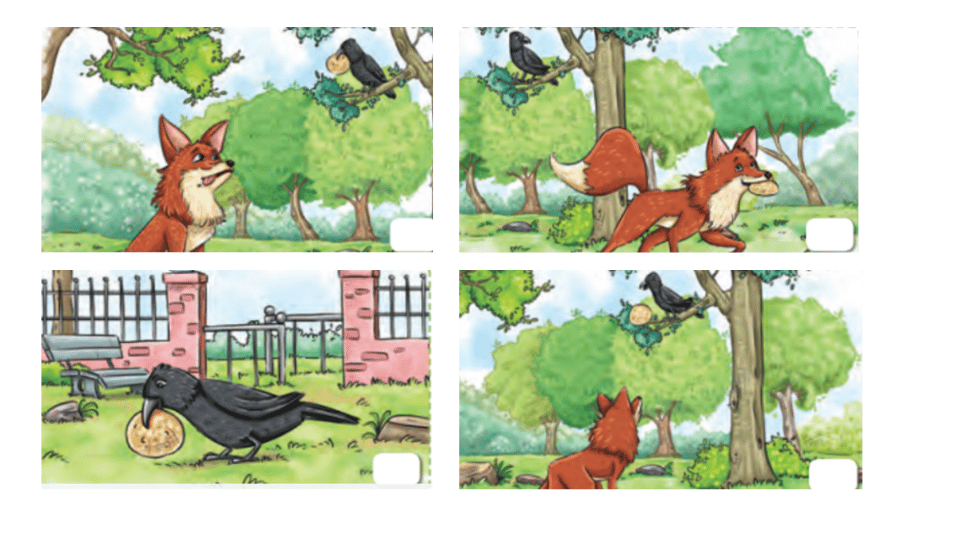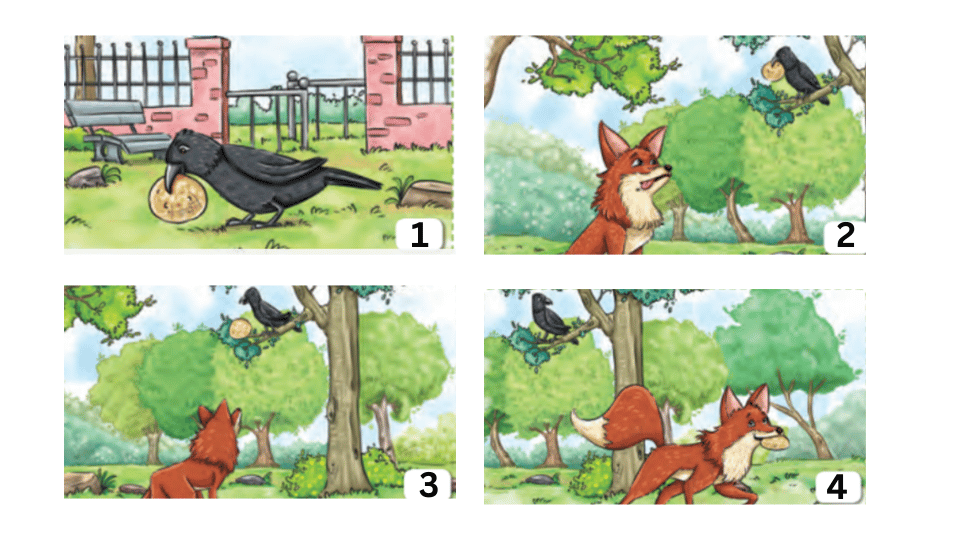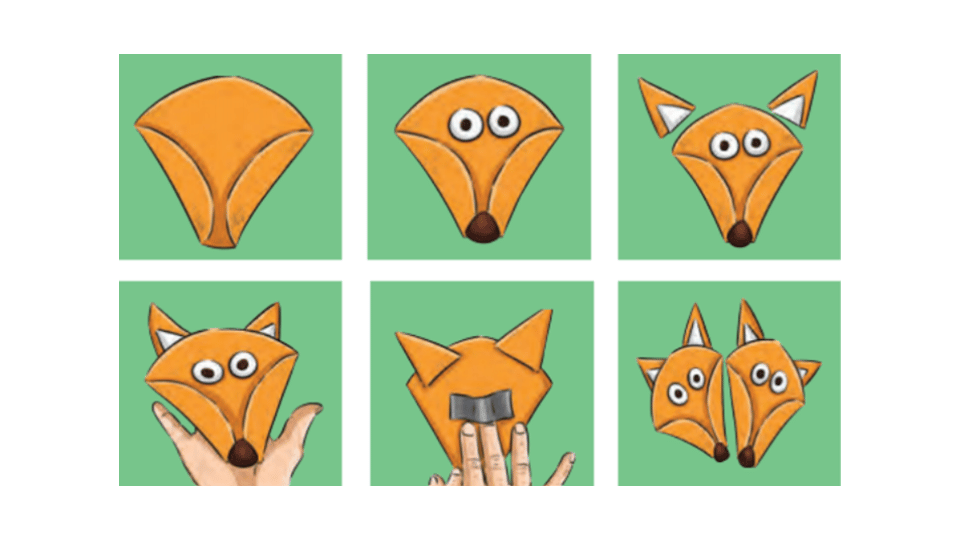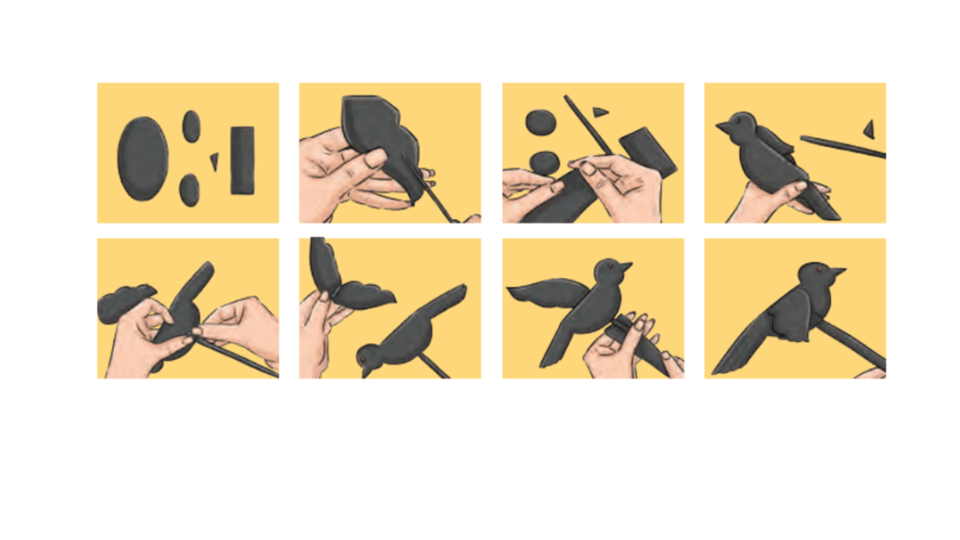Hello, students! Welcome to our solutions for Unit 1, Chapter 2 Poem – ‘The Raven and the Fox!’ We’re thrilled to guide you through this delightful poem and help you explore its meaning and lessons. Our team of English experts, with training both in India and abroad, is here to address all your queries and make learning enjoyable and enriching.
Find Solutions for NCERT Class 6 English Poorvi Unit 1 Chapter 2 ‘The Raven and the Fox,’ here.
Let us do these activities before we read.
1. We know that frogs croak. Did you know that ravens also croak?
Answer:
Yes, I have heard that ravens also croak.
2. Which animal is shown to be cunning in stories? Circle the correct answer:
(a) tiger
(b) fox
(c) bear
Answer: (b) fox
Let us discuss (Page 14)
1. Fill in the blanks by choosing the correct option.
(a) Stanza 1
(i) Mr Raven is a __________. (bird/frog)
(ii) The name of the fox is __________. (Raven/Reynard)
(iii) Mr Raven had __________ in his beak. (a piece of food/ a bunch of leaves)
(b) Stanza 2
(i) The Fox calls the Raven a __________ bird. (foolish/good-looking)
(ii) The Fox asks the Raven to __________. (dance/sing)
(iii) The Raven and the Fox live in the __________. (trees/woods)
(c) Stanza 3
(i) The Raven ___________ that he croaked. (remembered/forgot)
(ii) The Raven opened its beak to ___________. (eat/sing)
(iii) The ___________ fell down. (food/Raven)
(d) Stanza 4
(i) The Fox ___________ at the Raven. (laughed/looked)
(ii) It is not ___________ to be too proud of oneself. (wise/unwise)
(iii) The Raven learnt a ______________. (lesson/teaching)
Answer:
(a) Stanza 1
(i) Mr Raven is a bird. (bird/frog)
(ii) The name of the fox is Reynard. (Raven/Reynard)
(iii) Mr Raven had a piece of food in his beak. (a piece of food/ a bunch of leaves)
(b) Stanza 2
(i) The Fox calls the Raven a good-looking bird. (foolish/good-looking)
(ii) The Fox asks the Raven to sing. (dance/sing)
(iii) The Raven and the Fox live in the woods. (trees/woods)
(c) Stanza 3
(i) The Raven forgot that he croaked. (remembered/forgot)
(ii) The Raven opened its beak to sing. (eat/sing)
(iii) The food fell down. (food/Raven)
(d) Stanza 4
(i) The Fox laughed at the Raven. (laughed/looked)
(ii) It is not wise to be too proud of oneself. (wise/unwise)
(iii) The Raven learnt a lesson. (lesson/teaching)
2. Read the poem again and match the words in Column A with their meanings in Column B. Check your answers with your teacher and your classmates.
| Column A | Column B |
| 1. perched | (a) a small piece of food |
| 2. morsel | (b) looked with interest at something |
| 3. seek | (c) feeling that you are better than others |
| 4. pride | (d) sat on a branch |
| 5. eyed | (e) to look for something |
| 6. limb | (f) a smaller area of forest with similar kind of trees |
| 7. woods | (g) branch of a tree |
Answer:
| Column A | Column B |
| 1. perched | (d) sat on a branch |
| 2. morsel | (a) a small piece of food |
| 3. seek | (e) to look for something |
| 4. pride | (c) feeling that you are better than others |
| 5. eyed | (b) looked with interest at something |
| 6. limb | (g) branch of a tree |
| 7. woods | (f) a smaller area of forest with similar kind of trees |
Text Book Page no 15
Let us think and reflect
1. Look at the pictures and number them in the order that they happen in the poem.

Answer:

2. Read the following lines and answer the questions that follow.
(a) Sir Raven, you are a handsome bird.
Such feathers! If you would only sing,
The birds of these woods would call you King.
(i) ‘Such feathers’ refer to __________________ feathers.
a. shiny and beautiful
b. black and dull
c. grey and long
d. short and unattractive
Answer:
a. shiny and beautiful
(ii) Why would the birds of the woods call the Raven ‘King’?
Answer:
(ii) The birds of the woods would call the Raven ‘King’ if the raven would sing. The cunning Fox flattered the Raven by implying that if the Raven would sing melodiously to match his beautiful feathers, he would be fit to be crowned king of the birds.
(iii) Why does the Fox address the Raven as ‘Sir’?
Answer:
The Fox addresses the Raven as ‘Sir’ to flatter him and gain his trust, making it easier to trick him into dropping the morsel.
(b) The Raven, who did not see the joke,
Forgot that his voice was just a croak.
He opened his beak, in his foolish pride–
(i) Why did the Raven open his beak?
Answer:
(i) The Raven opened his beak to sing because he felt so pleased and proud to hear the Fox’s compliments that he wanted to show off.
(ii) Complete the following with one word from the given lines.
Fox: clever: : Raven : ______________
Answer:
Fox: clever: : Raven : foolish
3. Why does the Raven forget that his voice is just a croak?
Answer:
The Raven forgets that his voice is just a croak because he is blinded by pride owing to the flattery by the Fox.
4. How does Reynard make the Raven sing?
Answer:
Reynard makes the Raven sing by appealing to the Raven’s vanity. Reynard praises the Raven’s appearance and suggests that his singing would make him the king of the birds.
5. Why does Reynard say that pride is not wise?
Answer:
Reynard says that pride is not wise because it makes people vulnerable to deception, as seen when the Raven loses his morsel being blinded by pride.
6. Give one reason why the teaching is quite a surprise.
Answer:
The teaching is quite a surprise for the Raven because he did not expect to be duped by the cunning Fox who wore down his defences by flattering him.
7. Imagine someone praises you too much. How would you react?
Answer:
If someone were to praise me too much without reason, I would not let the praises blind me but try to figure out what are his true intentions so that I am not duped or manipulated.
Text Book Page 16
Let us learn
1. Write the rhyming words from the poem. One has been done for you.
Stanza 1
(a) limb-him
(b)______ ______
Stanza 2
(a) word-______
(b)______ ______
Stanza 3
(a) joke-______
(b)______ ______
Stanza 4
(a) know-______
(b)______ ______
Answer:
Stanza 1
(a) limb-him
(b) beak – seek
Stanza 2
(a) word – bird
(b) sing – king
Stanza 3
(a) joke- croak
(b) pride – eyed
Stanza 4
(a) know – glow
(b) unwise – surprise
2. Study the underlined words in the poem.
(a) For the Raven held in his great big beak.
The words ‘big’ and ‘beak’ begin with the same /b/ sound.
(b) The song of sweet birds
Alliteration is a repetition of consonant sounds at the beginning of words. When two or more words together, begin with the same sound, it is called alliteration.
Now, pick another example of alliteration from Stanza 2.
Answer:
An example of alliteration from Stanza 2 is “woods would”
3. Choose the correct opposites from the box given below and complete the table. There are two extra words that you will not need.
| wise | happy | humility | flew | remembered |
| notice | dim | cried | silly |
| Words | Opposites |
| 1. perched | |
| 2. forgot | |
| 3. foolish | |
| 4. pride | |
| 5. laughed | |
| 6. ignore | |
| 7. glow |
Answer:
| Words | Opposites |
| 1. perched | flew |
| 2. forgot | remembered |
| 3. foolish | wise |
| 4. pride | humility |
| 5. laughed | cried |
| 6. ignore | notice |
| 7. glow | dim |
Use any four words from the table given above to make sentences of your own.
Answer:
1. I remembered to wish my friend on her birthday.
2. Perched on a branch overhanging the lake, the kingfisher looked out for fish to catch.
3. The teacher did not notice that some students did not hand in their assignments.
4. If we ignore her first offence, the child will likely become a habitual offender.
Text book Page no 18
Let us listen
You will listen to what the crow did after he lost his food. As you listen, mark the given statements as True or False. (refer to page 37 for transcript)
(a) The crow was unhappy that he lost his food.
(b) The crow thought that his lovely feathers made him smart.
(c) The crow wanted to tell his friends not to be proud.
Answer:
a) The crow was unhappy that he lost his food. TRUE
(b) The crow thought that his lovely feathers made him smart. FALSE
(c) The crow wanted to tell his friends not to be proud. TRUE
Text Book Page no 18
Let us speak
Narrate the poem in the form of a story. Give a different ending to the story. You may begin like this:
This is a story about a clever fox named Reynard and Mr Raven. One day…
Answer:
This is the story about a clever fox named Reynard and Mr Raven. One day Mr Raven found a tasty morsel of cheese which he looked forward to enjoying safely perched on the branch of a tall tree. Just then, Reynard, the fox spotted him and his eyes shone with greed. He approached the tree and greeted Mr Raven cheerfully. Then he started flattering Mr Raven by praising his shiny black feathers and coaxed him to sing saying that the birds would hail him as their king if he sang.
Swayed by all the praise Mr Raven forgot that he could not sing and opened his mouth to demonstrate his talent. The cheese fell out of his mouth. In a flash the clever fox picked it up.
As Reynard looked up at the astonished crow to mock him and teach him a lesson on being wary of sweet talkers, a little squirrel dashed out of the bushes, snatched the piece of cheese from the fox and ran up a tree to safety! The fox was caught unawares. The squirrel cheekily told the fox to hunt for his own food instead of tricking others out of their food.
The Raven mocked Reynard for being outwitted by a tiny squirrel. Reynard apologized and declared that he would be honest and kind in future.
Text Book Page no 18
Let us write
Now, write the story you narrated in the form of a conversation. (Remember to write only the actions for the Raven as he has food in his mouth and does not speak.)
You may begin like this.
Reynard: Good morning, Mr Raven! You seem to be awake so early!
(Mr Raven just nods his head)
Reynard: Oh, Mr Raven, you look …
Answer:
“Conversation with a Different Ending”
Reynard: Good morning, Mr. Raven! You seem to be awake so early!
(Mr. Raven just nods his head)
Reynard: Oh, Mr. Raven, you look exceedingly handsome with those beautiful black shiny feathers! If only you could sing, all the birds would call you King.
(Mr. Raven, feels flattered and forgets he cannot sing, opens his beak to sing, and the morsel falls to the ground)
Reynard: (Grabs the morsel and looks up at the raven) Ha-ha! You should not be so easily flattered!
(A squirrel dashes out, snatches the morsel from Reynard, and runs up a tree)
Squirrel: You should hunt for your own food instead of tricking other animals, Reynard!
Mr. Raven: (Chuckles silently) It seems you’ve been outwitted by a tiny creature, Reynard! Perhaps next time, you’ll think twice before trying to dupe someone.
Reynard: (Looking embarrassed) You’re right. I’ll try to be honest and kind from now on.
Let us explore (Page 19)
Origami is an art of folding objects out of paper to create both two-dimensional and three dimensional objects. Let us make stick puppets and enact the poem. You may take the help of the pictures given below.


Answer:
Make these interesting figures together with your classmates and enjoy using the puppets to narrate the story in your own words.
Frequently Asked Questions (FAQs) on NCERT Class 6 English Poorvi Unit 1 Chapter 2 ‘The Raven and the Fox’
We have seasoned English experts on staff who have taken care to explain the poem to you in a lucid and easy-to understand manner. Solutions to all end text questions and in-text activities have been provided which cover the poem in detail and help you focus on the important aspects of the poem.
You can also download the free PDFs of the solutions anytime you please! We will keep providing you with plenty of top-quality study material and resources to help you prepare. So, make sure you keep visiting our website and join our email list to take advantage of them! (insert hyperlink)
Yes indeed! You can download the free PDF versions of these excellent solutions anytime (please look towards the top of the page)!
The Raven and the Fox” by Jean de La Fontaine is a fable about a raven who finds a piece of cheese and perches on a tree. A cunning fox, desiring the cheese, flatters the raven by praising its beauty and voice. The raven, pleased with the compliments, opens its beak to sing, causing the cheese to fall. The fox swiftly snatches the cheese and mocks the raven for being fooled by flattery. The moral of the story is that one should not be deceived by flattery, as it can lead to misfortune.
Our experienced English faculty have crafted these solutions which guide you to notice every detail of the poem. We advise you to go through the poem at first and look up the meanings of words that you might not know. This step must not be skipped as it will not only help you to understand the poem better, but also enrich your vocabulary to a great extent.
Then you need to go through all the answers we have thoughtfully provided – both to the questions at the back of the book as well as the in-text questions and activities in order to grasp the essence of the poem. Pay close attention to details. Do not memorise because understanding the text is the key to learning.
Subsequently, you need to practise writing down the answers within a specific time frame. You can then ace your exams! There is no short cut to success! Systematic study will help you achieve what you want.
Feeling lost or anxious about your studies and future? We understand how overwhelming it can be to face these challenges alone. But don’t worry, you’re not alone—and we’re here to help.
At educationroundtheworld.com, we connect you with dedicated teacher-mentors who are passionate about guiding students like you toward success. Our mentors are committed to helping you navigate your journey with clarity, offering the support you need to achieve your goals.
Book your first session with us, you’ll begin the process of creating a customized study plan that suits your unique needs and aspirations. Together, we’ll focus on building your confidence and skills so you can move forward with a clear, actionable plan for success.
Say goodbye to the stress and uncertainty—let’s work together to pave the way for your bright future, starting today!
Take the first step now—reach out to us and unlock your full potential!


